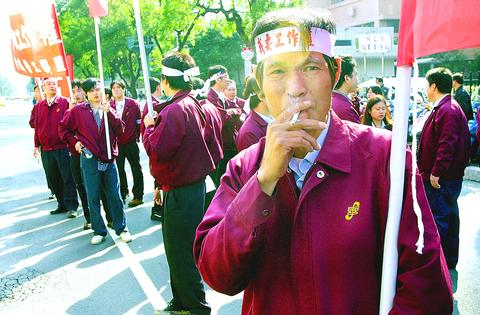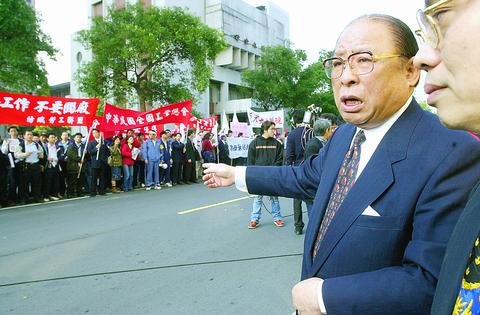Opposition lawmakers yesterday put forth a compromise measure that may end the ongoing workweek dispute.
At issue is whether Taiwan's workers will put in 44 hours of work per week beginning Jan. 1 or 84 hours per fortnight.
Lawmakers have proposed keeping the 84-hour-per-fortnight measure, but still want to allow employers the ability to negotiate with their employees to schedule longer hours.

PHOTO: CHEN CHENG-CHANG, TAIPEI TIMES
"In principle, we still stick to the 84-hour-per-fortnight measure," said Lai Shyh-bao (
Under the proposal -- which has been jointly endorsed by leaders of the KMT, People First Party and New Party caucuses -- the maximum number of hours an employee is required to work cannot exceed 84 in a two-week period.
However, the limit could be set at 88 hours over a two-week period if employers obtain union approval or if at least half of a company's workers agree. In addition, local officials in charge of labor affairs must formally approve the plan.

PHOTO: CHEN CHENG-CHANG, TAIPEI TIMES
PFP caucus spokeswoman Diane Lee (李慶安) said involving labor affairs officials would help facilitate mediation in case of a dispute.
The opposition legislators said the proposal is pending the consent of labor representatives before the measure can be passed in the next Legislative Yuan meeting on Tuesday.
While industry representatives have accepted the proposal, labor groups have yet to weigh in on the idea.
"The two sides will take the proposal back to conduct further internal discussions. We are doing our best to seek a solution that satisfies both of them," said KMT caucus whip Her Jyh-huei (
Opposition lawmakers put forth yesterday's proposal after labor groups refused to sit down to negotiate with the DPP legislative caucus, which was pushing the Executive Yuan's plan to introduce a 44-hour workweek on Jan. 1.
Worker representatives have insisted that the legislature stick to its June 16 decision to go for an 84-hour-per-fortnight measure.
Lin Huei-kwung (
Meanwhile, some workers expressed fear that if employers were offered the ability to negotiate with employees, workers who want shorter hours but lack popular support would be forced to accept a longer workweek.
"It's impossible for workers who are not organized to fight with their employers. This is like making workers accept a 44-hour workweek automatically," said Wuo Young-Ie (
But a different group of workers from the textile industry offered a different opinion at the Legislative Yuan yesterday.
These workers said because their employers have earned less money due to the slowing economy, further shortening the workweek would simply worsen the situation.
"If our factories are closed down, we will lose our jobs," one of the textile workers said.
In addition, Academia Sinica President Lee Yuan-tseh (
Lee said because employee paychecks won't decline after the workweek is shortened to 84 hours per fortnight from 48 hours per week today -- a 4.5 percent reduction -- Taiwan firms would need to increase productivity by 20 percent.
If a company fails to boost productivity, bankruptcy will result and workers will become jobless, Lee warned.

MAKING WAVES: China’s maritime militia could become a nontraditional threat in war, clogging up shipping lanes to prevent US or Japanese intervention, a report said About 1,900 Chinese ships flying flags of convenience and fishing vessels that participated in China’s military exercises around Taiwan last month and in January have been listed for monitoring, Coast Guard Administration (CGA) Deputy Director-General Hsieh Ching-chin (謝慶欽) said yesterday. Following amendments to the Commercial Port Act (商港法) and the Law of Ships (船舶法) last month, the CGA can designate possible berthing areas or deny ports of call for vessels suspected of loitering around areas where undersea cables can be accessed, Oceans Affairs Council Minister Kuan Bi-ling (管碧玲) said. The list of suspected ships, originally 300, had risen to about 1,900 as

Japan’s strategic alliance with the US would collapse if Tokyo were to turn away from a conflict in Taiwan, Japanese Prime Minister Sanae Takaichi said yesterday, but distanced herself from previous comments that suggested a possible military response in such an event. Takaichi expressed her latest views on a nationally broadcast TV program late on Monday, where an opposition party leader criticized her for igniting tensions with China with the earlier remarks. Ties between Japan and China have sunk to the worst level in years after Takaichi said in November that a hypothetical Chinese attack on Taiwan could bring about a Japanese

Right-wing political scientist Laura Fernandez on Sunday won Costa Rica’s presidential election by a landslide, after promising to crack down on rising violence linked to the cocaine trade. Fernandez’s nearest rival, economist Alvaro Ramos, conceded defeat as results showed the ruling party far exceeding the threshold of 40 percent needed to avoid a runoff. With 94 percent of polling stations counted, the political heir of outgoing Costa Rican President Rodrigo Chaves had captured 48.3 percent of the vote compared with Ramos’ 33.4 percent, the Supreme Electoral Tribunal said. As soon as the first results were announced, members of Fernandez’s Sovereign People’s Party

MORE RESPONSIBILITY: Draftees would be expected to fight alongside professional soldiers, likely requiring the transformation of some training brigades into combat units The armed forces are to start incorporating new conscripts into combined arms brigades this year to enhance combat readiness, the Executive Yuan’s latest policy report said. The new policy would affect Taiwanese men entering the military for their compulsory service, which was extended to one year under reforms by then-president Tsai Ing-wen (蔡英文) in 2022. The conscripts would be trained to operate machine guns, uncrewed aerial vehicles, anti-tank guided missile launchers and Stinger air defense systems, the report said, adding that the basic training would be lengthened to eight weeks. After basic training, conscripts would be sorted into infantry battalions that would take